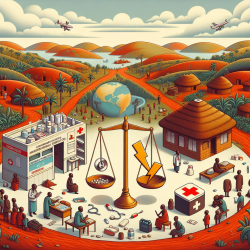Introduction
The aftermath of serious violations of International Humanitarian Law (IHL) in northern Uganda reveals profound impacts on victims' health and well-being. The study titled "International humanitarian law violations in northern Uganda: victims' health, policy, and programming implications" provides crucial insights into the long-term effects of these violations. This blog explores how practitioners can enhance their skills by understanding these outcomes and encourages further research into the field.
Understanding the Impact
The research highlights that victims of IHL violations in northern Uganda are significantly worse off than the general war-affected population. Thirteen years post-massacre, these individuals and their households, including children born after the events, continue to suffer from lower health service availability, greater distances to healthcare facilities, and persistent health and well-being disparities.
Key Findings for Practitioners
- Physical and Emotional Trauma: Victims experience complex physical disabilities and psychosocial trauma that hinder long-term recovery. Practitioners should prioritize trauma-informed care to address these needs effectively.
- Access to Health Services: The study reveals a significant gap in the availability of appropriate health services for victims. Practitioners must advocate for improved healthcare access and infrastructure in affected regions.
- Multi-generational Impact: Children born into victim households exhibit lower school enrollment and attendance rates. This underscores the need for holistic family and community support systems.
Encouraging Further Research
While the study provides critical insights, it also highlights the need for further research into the long-term impacts of IHL violations. Practitioners are encouraged to explore the following areas:
- Investigate the effectiveness of current trauma care models and explore innovative approaches to improve outcomes.
- Examine the socio-economic factors that exacerbate health disparities among victims and their families.
- Assess the role of policy and programming in addressing the needs of affected populations and promoting recovery.
Conclusion
Practitioners working in conflict-affected regions must be equipped with the knowledge and skills to address the complex needs of victims of IHL violations. By understanding the outcomes of this research and engaging in further studies, practitioners can contribute to more effective health interventions and policies that support recovery and resilience.
To read the original research paper, please follow this link: International humanitarian law violations in northern Uganda: victims' health, policy, and programming implications.










